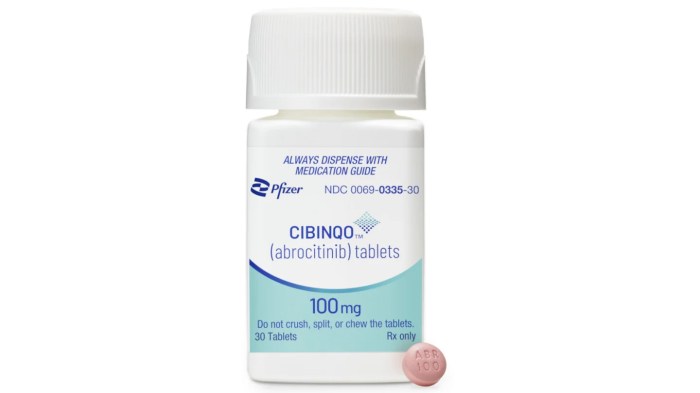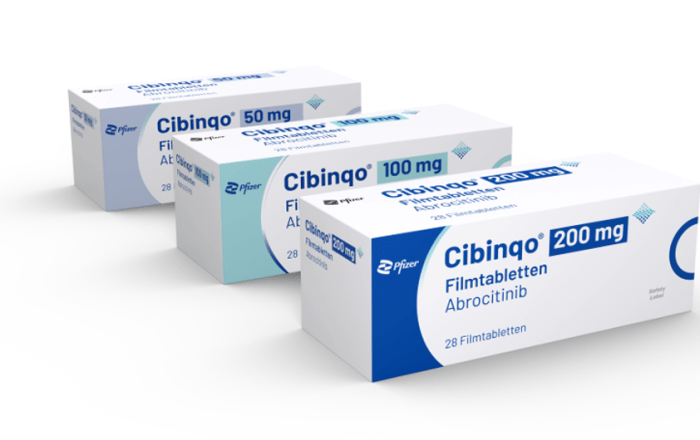Cibinqo, a groundbreaking treatment, offers a beacon of hope for individuals grappling with debilitating skin conditions. This medication stands out for its innovative approach, targeting the root cause of these conditions, rather than simply managing symptoms. Cibinqo’s journey began with extensive research and development, culminating in clinical trials that demonstrated its efficacy and safety.
Cibinqo’s mechanism of action involves inhibiting specific signaling pathways that play a crucial role in the development and progression of inflammatory skin diseases. This targeted approach has revolutionized the treatment landscape, offering a new paradigm for managing these conditions.
Cibinqo
Cibinqo, also known by its generic name abrocitinib, is a prescription medication used to treat certain types of eczema. It is a type of medication known as a JAK inhibitor.
What is Cibinqo Used To Treat?
Cibinqo is used to treat moderate to severe atopic dermatitis (eczema) in adults who are not adequately controlled with topical treatments or who cannot tolerate them. It is also used to treat eczema in children aged 2 years and older who have not responded well to other treatments.
How Does Cibinqo Work?
Cibinqo works by blocking the activity of certain enzymes called Janus kinases (JAKs). JAKs are involved in the signaling pathways that control inflammation in the body. By blocking JAKs, Cibinqo reduces inflammation and itching associated with eczema.
Cibinqo
Cibinqo (abrocitinib) is a prescription medicine used to treat adults with moderate to severe atopic dermatitis (eczema) who are not adequately controlled with topical therapies or whose condition is not suitable for topical therapies. It is also approved for treating adults with moderate to severe plaque psoriasis who are candidates for systemic therapy.
Key Features and Benefits
Cibinqo is a targeted therapy that works by inhibiting a specific protein called Janus kinase 1 (JAK1). This protein is involved in the inflammatory process that causes atopic dermatitis and psoriasis. By blocking JAK1, Cibinqo helps to reduce inflammation and improve symptoms.
- Targeted Therapy: Cibinqo specifically targets JAK1, a key protein involved in the inflammatory process that causes atopic dermatitis and psoriasis. This targeted approach helps to minimize the impact on other parts of the body, potentially leading to fewer side effects.
- Effective Treatment: Studies have shown that Cibinqo can effectively improve symptoms of atopic dermatitis and psoriasis. Patients who take Cibinqo often experience significant reductions in itching, redness, and scaling.
- Convenient Dosing: Cibinqo is taken once daily, making it a convenient treatment option for patients.
- Improved Quality of Life: By reducing the symptoms of atopic dermatitis and psoriasis, Cibinqo can improve the quality of life for patients. This can include improved sleep, reduced social anxiety, and increased ability to participate in daily activities.
Comparison to Other Treatments
Here is a table comparing Cibinqo to other treatments for atopic dermatitis and psoriasis:
| Treatment | Mechanism of Action | Route of Administration | Frequency | Side Effects |
|---|---|---|---|---|
| Cibinqo (abrocitinib) | JAK1 inhibitor | Oral | Once daily | Common side effects include headache, upper respiratory tract infection, and acne. |
| Dupixent (dupilumab) | IL-4 and IL-13 inhibitor | Subcutaneous injection | Every 2 weeks | Common side effects include injection site reactions, conjunctivitis, and headache. |
| Otezla (apremilast) | PDE4 inhibitor | Oral | Twice daily | Common side effects include diarrhea, nausea, and headache. |
| Topical Corticosteroids | Anti-inflammatory | Topical | As needed | Common side effects include skin thinning, stretch marks, and acne. |
Cibinqo

Cibinqo (abrocitinib) is a medication used to treat moderate to severe atopic dermatitis (eczema) in adults. It is a Janus kinase (JAK) inhibitor that works by blocking the activity of certain proteins in the immune system that contribute to inflammation.
Administration and Dosage
Cibinqo is administered orally, meaning it is taken by mouth. The typical dosage of Cibinqo is 200 mg once daily.
The frequency and duration of treatment with Cibinqo will vary depending on the individual patient and the severity of their condition. Your doctor will determine the appropriate dosage and treatment duration for you.
It is important to take Cibinqo exactly as prescribed by your doctor. Do not take more or less of it than prescribed, and do not stop taking it without talking to your doctor.
- Special considerations for administering Cibinqo to specific patient populations:
- Patients with severe liver impairment may require a lower dosage of Cibinqo.
- Cibinqo should be used with caution in patients with a history of tuberculosis or other infections.
- Cibinqo should not be used in patients who are pregnant or breastfeeding.
- Cibinqo should be used with caution in patients with a history of heart problems.
Cibinqo

Cibinqo is a prescription medicine used to treat moderate to severe plaque psoriasis in adults. It is a targeted therapy that works by blocking a specific protein that plays a role in the development of psoriasis. While Cibinqo can be effective in treating psoriasis, it is important to be aware of the potential side effects and risks associated with its use.
Side Effects and Risks
Like all medications, Cibinqo can cause side effects. Some side effects are common, while others are rare. It is important to discuss any concerns you have with your doctor.
- Common side effects of Cibinqo include:
- Upper respiratory tract infection
- Headache
- Nausea
- Diarrhea
- Fatigue
- Pain in the extremities
- Rare side effects of Cibinqo include:
- Serious infections
- Liver problems
- Infusion reactions
- Blood clots
- Cancer
Cibinqo is not right for everyone. It is important to discuss your medical history with your doctor before starting Cibinqo. You should not take Cibinqo if you:
- Are allergic to Cibinqo or any of its ingredients
- Have a serious infection
- Have severe liver problems
- Are pregnant or breastfeeding
It is important to be aware of the potential risks associated with Cibinqo and to discuss any concerns you have with your doctor.
| Side Effect | Severity | Frequency |
|---|---|---|
| Upper respiratory tract infection | Mild | Common |
| Headache | Mild | Common |
| Nausea | Mild | Common |
| Diarrhea | Mild | Common |
| Fatigue | Mild | Common |
| Pain in the extremities | Mild | Common |
| Serious infections | Severe | Rare |
| Liver problems | Severe | Rare |
| Infusion reactions | Severe | Rare |
| Blood clots | Severe | Rare |
| Cancer | Severe | Rare |
Cibinqo
Cibinqo (abrocitinib) is a selective, oral, small-molecule Janus kinase (JAK) 1 inhibitor indicated for the treatment of adults with moderate to severe atopic dermatitis (AD) who are candidates for systemic therapy. It is designed to target the JAK1 pathway, which is involved in the inflammatory response associated with AD.
Clinical Trials and Research, Cibinqo
Numerous clinical trials have been conducted to evaluate the efficacy and safety of Cibinqo for the treatment of atopic dermatitis. These trials have demonstrated that Cibinqo is effective in reducing the severity of AD symptoms, including itching, redness, and scaling.
- JADE 1 and JADE 2: These pivotal phase 3 trials evaluated the efficacy and safety of Cibinqo in adults with moderate to severe AD. Both trials showed that Cibinqo significantly improved skin clearance and reduced itching compared to placebo.
- JADE MONO 1 and JADE MONO 2: These phase 3 trials assessed the efficacy and safety of Cibinqo monotherapy in adults with moderate to severe AD who had previously failed topical therapy. Both trials demonstrated that Cibinqo monotherapy was effective in achieving significant improvement in skin clearance and itch relief.
- JADE COMBO 1: This phase 3 trial evaluated the efficacy and safety of Cibinqo in combination with topical corticosteroids in adults with moderate to severe AD. The trial showed that Cibinqo in combination with topical corticosteroids resulted in greater improvement in skin clearance compared to topical corticosteroids alone.
Cibinqo has been shown to be generally well-tolerated in clinical trials. The most common adverse reactions reported were upper respiratory tract infection, headache, and nasopharyngitis.
Ongoing research related to Cibinqo is exploring its potential applications in other inflammatory skin conditions, such as psoriasis and hidradenitis suppurativa. Researchers are also investigating the long-term safety and efficacy of Cibinqo in patients with AD.
Timeline of Significant Research Milestones
- 2017: Pfizer initiates phase 2 clinical trials of abrocitinib for the treatment of atopic dermatitis.
- 2019: Pfizer announces positive results from the phase 3 JADE 1 and JADE 2 trials, demonstrating the efficacy and safety of Cibinqo for the treatment of atopic dermatitis.
- 2020: The U.S. Food and Drug Administration (FDA) approves Cibinqo for the treatment of adults with moderate to severe atopic dermatitis.
- 2021: Pfizer announces positive results from the phase 3 JADE MONO 1 and JADE MONO 2 trials, demonstrating the efficacy of Cibinqo monotherapy in adults with moderate to severe atopic dermatitis.
- 2022: The FDA approves Cibinqo for the treatment of adults with moderate to severe atopic dermatitis who have failed topical therapy.
Cibinqo’s impact extends beyond its therapeutic benefits, inspiring a wave of advancements in the field of dermatology. Its success has paved the way for further research into novel treatments that target specific molecular pathways, promising a future where debilitating skin conditions are effectively managed and potentially even cured. As we continue to learn more about Cibinqo and its potential, the hope for a brighter future for those affected by these conditions grows stronger.
Cibinqo is a medication used to treat moderate to severe atopic dermatitis, a chronic skin condition. While Cibinqo works on the immune system, it’s interesting to note that other medications like armodafinil , which is used to treat excessive sleepiness, also have an impact on the immune system. Understanding how different medications interact with the body’s defenses can lead to new insights into treating a variety of conditions, including atopic dermatitis.